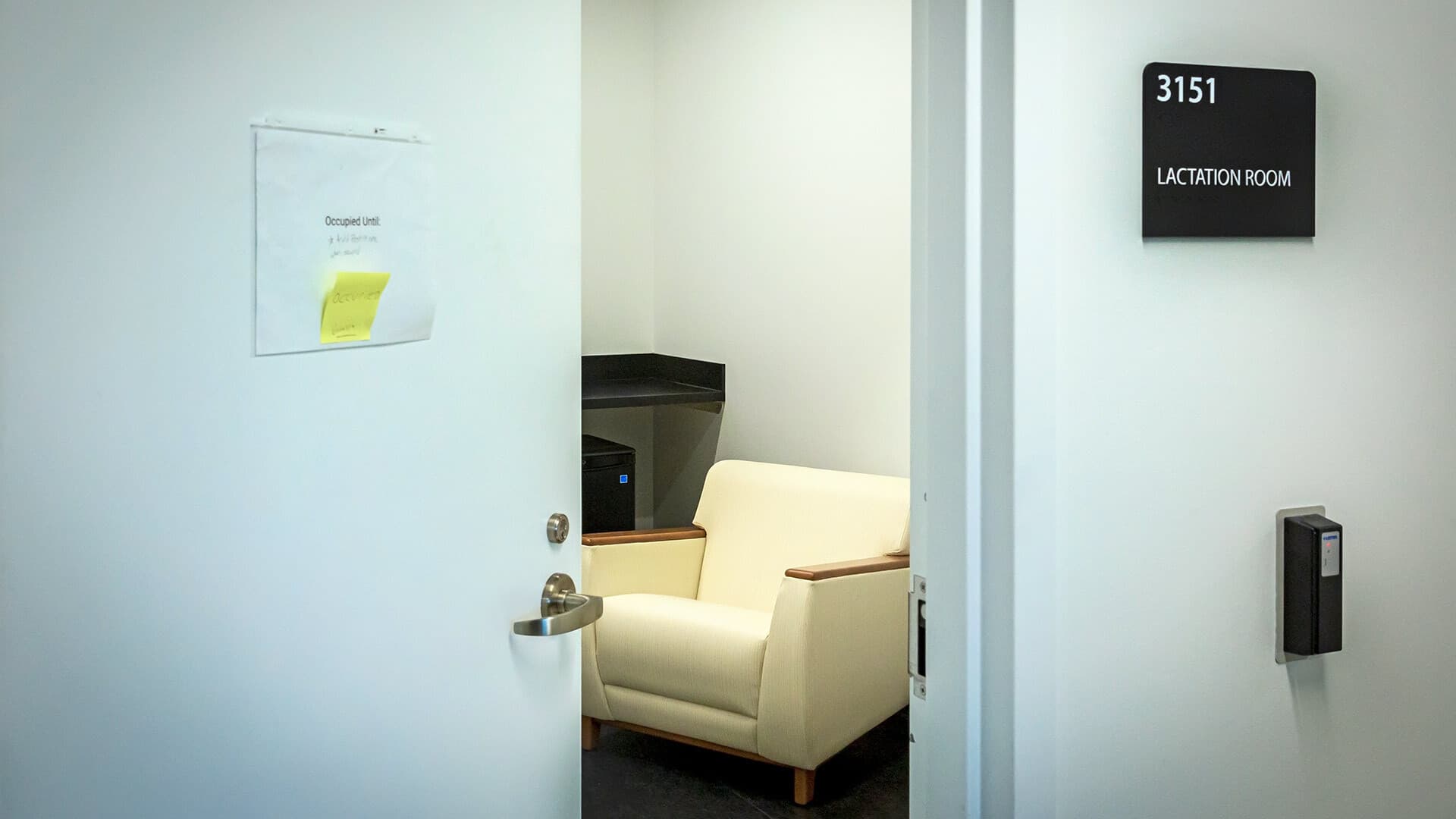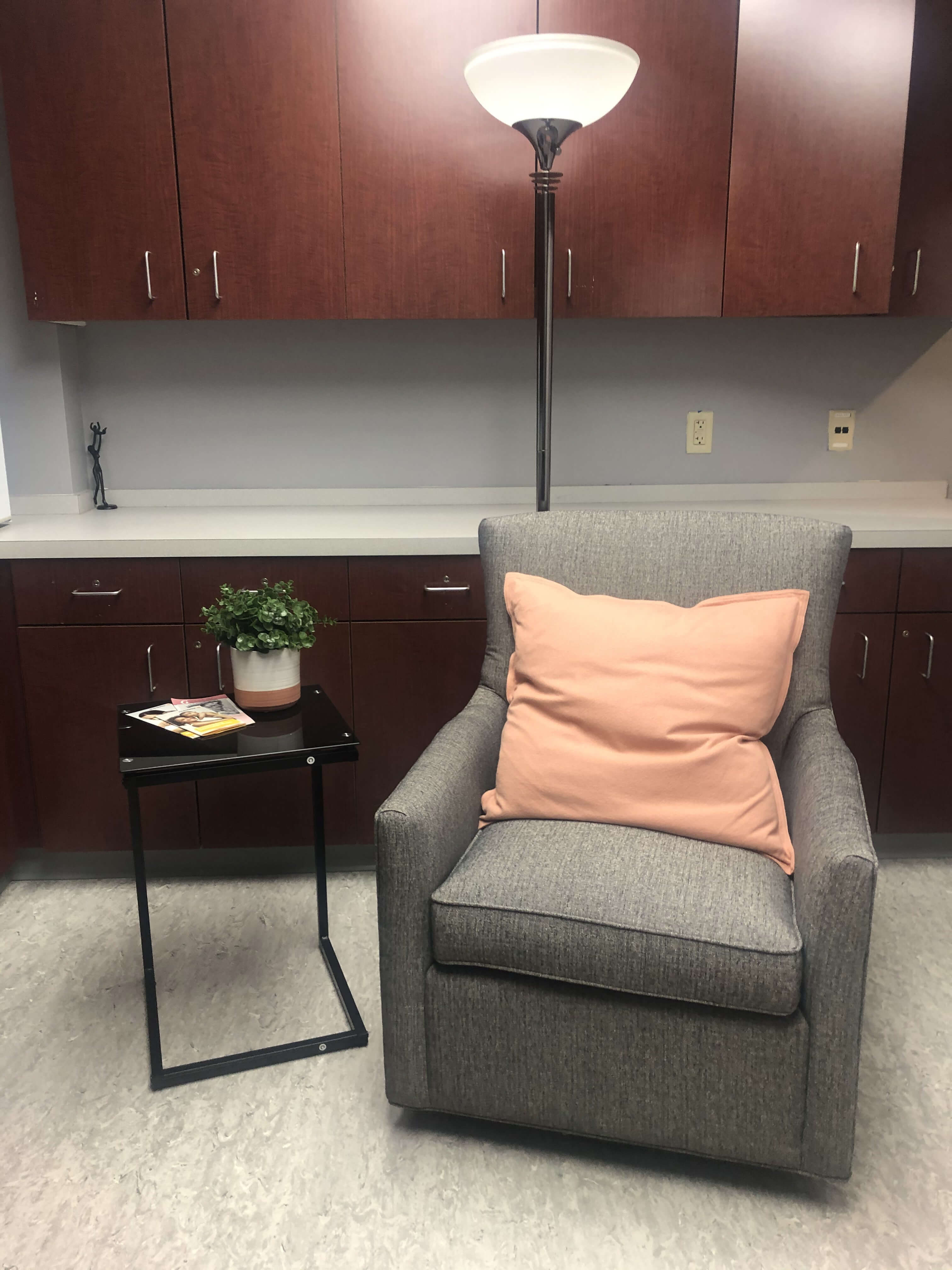Feeding a Need
Survey Assessing Campus’ Lactation Facilities

Iribe photo by Stephanie S. Cordle; SPH photo, below, courtesy of the School of Public Health
A survey created by the President’s Commission on Women’s Issues and the School of Public Health is gathering feedback and evaluating potential improvements about the university’s lactation/feeding rooms, such as those in the Brendan Iribe Center for Computer Science and Engineering (left) and the School of Public Health Building (below).
Neela B. Wilson M.A. ’17 was a new mom with a new UMD job when she helped host the annual Undergraduate Studies Advising Conference last year. So along with securing keynote speakers and coordinating breakout sessions, she also had to find a quiet spot to pump breast milk.
The lactation/feeding room in the Edward St. John Center, she discovered, had a mini fridge to store milk, and it was attached to a kitchen where she could wash her hands and pump components.
“I really liked that space because of all the nearby extra amenities,” said Wilson, the adviser for retention initiatives in the Student Success Office.
 Now, UMD is working to ensure similarly supportive spaces for feeding parents across campus. A new survey created by the President’s Commission on Women’s Issues and the School of Public Health is gathering feedback and evaluating potential improvements about the university’s lactation/feeding rooms. It remains open to students, faculty, staff, alumni and visitors through Sunday.
Now, UMD is working to ensure similarly supportive spaces for feeding parents across campus. A new survey created by the President’s Commission on Women’s Issues and the School of Public Health is gathering feedback and evaluating potential improvements about the university’s lactation/feeding rooms. It remains open to students, faculty, staff, alumni and visitors through Sunday.
“Our goal is to assess facilities and evaluate existing resources and needs so that we can better disseminate lactation/feeding information; it's critical that people know that these resources exist and are supported on campus,” said Erin McClure, chief of staff and diversity officer in the School of Public Health, which housed the first dedicated lactation/ feeding room at UMD and recently renovated it.
According to the Centers for Disease Control and Prevention, while a majority of U.S. mothers breastfeed their babies for some period of time, most don’t continue for as long as the American Academy of Pediatrics recommends: six months exclusively and another six months supplemented by other foods. Reasons for stopping include cultural norms and unsupportive work policies, the CDC says.
“It’s a really tricky transition, having a baby and having to come back to your work or school environment,” said Fiona Jardine MLS ’14, Ph.D. ’20, a College of Information Studies student and advanced lactation consultant who helped develop the survey and whose dissertation studies mothers who exclusively pump breast milk. “To not have (lactation/feeding rooms) be easily accessible … is just one more barrier.”
UMD has 17 such spaces listed on the campus map and a few others not yet listed, including rooms in the University Health Center and the Brendan Iribe Center for Computer Science and Engineering. To encourage breastfeeding on campus, the School of Public Health and President's Commission on Women's Issues received $42,500 from the Student Facilities Fund for room improvements, like adding comfortable furniture, adjustable lighting, softer paint color, outlets to plug in equipment, artwork and supportive messaging, and to develop the survey to better gauge campus need.
Among the questions: Are respondents pumping, bottle feeding or breastfeeding, and what spaces on campus have they used? Furthermore, did those spaces meet their needs, and what would be ideal in those facilities? Around 300 people have participated so far.
“We want to make sure whatever we’re doing going forward is actually responding to the needs they have,” Jardine said, “not just the needs we think they have.”
After analyzing the data, McClure and Jardine will prepare a report for campus partners and centralize the facilities information for feeding parents. They’ll also present at the American Public Health Association’s Annual Meeting and Expo in Philadelphia and the World Breastfeeding Conference in Brazil, both next month.
“It’s about total health and wellness,” McClure said, “not solely about the child’s health, but also about the health of the parent, which ultimately becomes the health of the family and the community.”